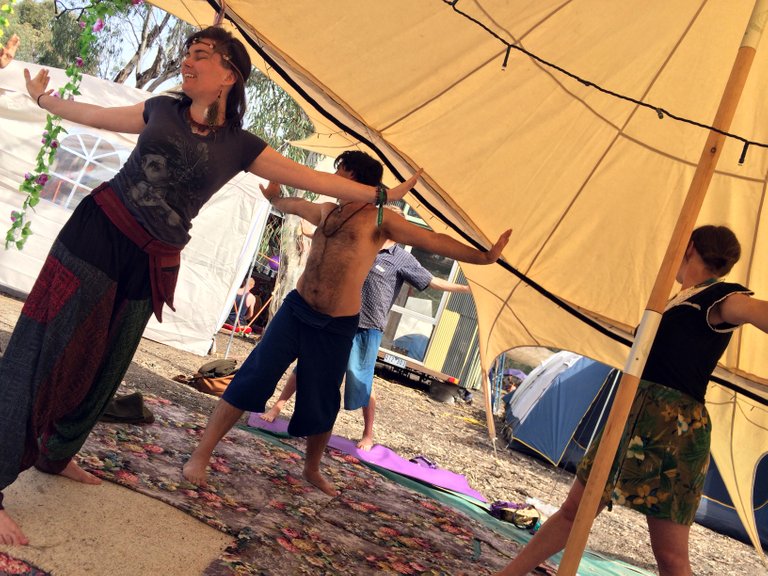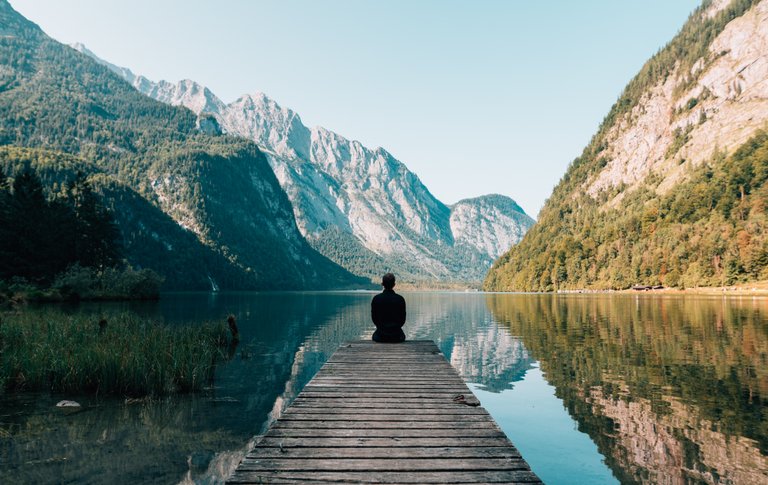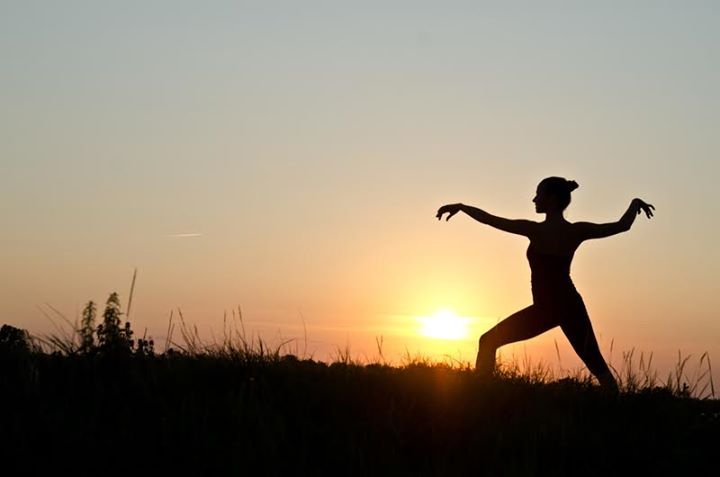As a dedicated practitioner and teacher of Qigong, I felt guilty when I gave up the practice at the end of last year. However, I came to understand that as a method for creatively supporting my mental health, there was more to this practice than movement, stretching, and breathing. This is my entry in the Thoughts For Steem #naturalmedicine contest by @naturalmedicine.
 Qigong at ConFest, Easter 2016
Qigong at ConFest, Easter 2016
Sleepy fire in your eyes
it's like desire in disguise
I keep on tryin'
but I can't get through
- The Grateful Dead
I have a confession to make.
For the last year-and-a-half, I've been really slack with my daily Qigong practice.
Let me clarify that statement: I've been really slack in the daily movement forms of Qigong. No matter how hard I tried to motivate myself, I just couldn't do it. Rationalising it has been easy: the weather hasn't been right, haven't had enough space at home, cosmic energy not being conducive, yadda yadda yadda....
These are just excuses, however. I'm justifying something to admonish myself of a sense of guilt or shame. The reality was simpler; I just couldn't motivate myself.
Here's the thing: I've been practicing Tai Chi & Qigong for about 20 years. About 5 years ago, I started teaching it, running classes and workshops. I even created my own Qigong form and have written a book about it. I've used the various types of this ancient Taoist practice to help hundreds of clients with their mental and emotional disorders. So to have abandoned a daily practice that has been a major part of my life (and my self-care routine) for so long is kind of a big deal.
Realising this, I contemplated my feelings. Under the layers of bravado was something interesting and surprising - a deep sense of longing for rest. I was craving the kind of stillness which early Taoist & Buddhist teachings refer to as equanimity or purposeless nothingness; like a drop of water returning to the vastness of the ocean. My Core-Self was screaming for it, yelling at my Consciousness "STOP!"
So I did.
Specifically, I stopped actively engaging with my body, energy, and spirit. I "got out of my own way", and allowed whatever to arise and emerge to do so, instead of directing everything like a control freak.
Instead, I put on some music. As I listened, I enjoyed every note, every counterpoint, every rhythm, and allowed my body to move in whichever way it felt like.
I went for walks and observed all that surrounded me in any moment with a lack of discernment, never judging, never reflecting or thinking about new and exciting content.
As I ate my meals, I savoured every flavour in every mouthful, enjoying each and every bite.
Listen, listen to the holler
I will write a book, it will be called
"Life and How to Live It"
- REM
When it comes to Qigong, I can often get carried away with its awesomeness. It is an amazing practice for improving circulation and respiration, stretching the tendons, and maintaining joint mobility. But its health benefits extend beyond these.
A review of randomised controlled trials (RCT's) in 2011 revealed that there is evidence to suggest Tai Chi & Qigong to have positive effects in many other areas of health, such as:
- improving falls and related risk factors,
- psychological symptoms
- immune function
- physical function
- bone density
- quality of life
More importantly, in one study that looked at the possible effects on mood and anxiety, Qigong - the combination of slow movements, deep regulated breathing, and mindfulness techniques - were shown to significantly reduce Depression, Anxiety, Anger, and Fatigue.
I became obsessed, however, with the physical effects I was getting. I became addicted to how my body felt after moving it around; how energised I felt after directing the breath and my internal energies. The sensation and awareness of mastering my own body was like a drug-hit. I would thrill at the sheer orgasmic wow-ness, being in awe of what I was truly capable of, and being turned on by the thought of what I may be able to achieve when I got better at the practice.
I kept reaching for more and more and more... I was writing and teaching on the dynamic interplay between yàng and yīn, movement and stillness... and yet I got caught up in what was happening in my body... ironically, only ever being in a constant state of movement.... of yàng...
Is it any wonder my Core-Self inevitably gave up on me, yelling "ENOUGH!" and forcing me into a long period of rest.
 Photo by Faye Cornish on Unsplash
Photo by Faye Cornish on Unsplash
Where was the yīn?
In all of my enthusiasm and passion for my practice, where was the nurturing, the soft kindness of rest, silence, and stillness?
Where was the gratitude and appreciation of what was already there, within and without?
Where was the self-love and self-care?
Once I sat in that truly yīn-space of stillness and quietude, I realised that I had been treating my Qigong practice as something to do, rather than a way of being.
So over the span of the last nine months, I've been embodying stillness, a deeper, gentler aspect of Qigong. This was the part that I had neglected for so long. Humbled, I was reminded of a passage from Lao Zi:
我有三寶持而保之: Wǒ yǒu sānbǎo chí ér bǎo zhī:
一曰慈,yī yuē cí;
二曰儉,èr yuē jiǎn;
三曰不敢為天下先。sān yuē bù gǎn wéi tiānxià xiān.I have three precious things which I grasp and protect:
The first is called gentleness;
the second is called frugality;
the third is called not daring to act in the world prior to anyone.
- Tao Te Ching, verse 67 (my translation)
Qigong isn't what you think it is.
It isn't just about moving the body and opening the joints; it isn't just about developing strength and flexibility; it isn't just about learning to master one's own energies and direct them at will, in whichever direction, and for any desired purpose.
Qigong is about living your life and going about your normal daily routine, without the false and acquired conditioning. It's about balancing activity with rest. It's about being aware of what your whole Being needs in any given moment. It's about being aware of the difference between your conditioning and your true nature.
So for the last few months, I've been cooking, cleaning, writing, walking, sitting, eating, shitting, showering, listening to music, driving, and talking the same as I ever would - but with one fundamental difference:
I've been doing it with humility, presence, and with self-love.
😊🙏🏽☯️
Take me there and back again
Some days it's a sad world, let it be
What's the point of looking for this power divine?
It's already in my changes
And every time I hear your voice
I realise I have a choice
To live again
I deserve this choice
To live again
- Yes
 Photo by Simon Migaj on Unsplash
Photo by Simon Migaj on Unsplash
MADE FOR STEEMIT
Like what you read?
Listen to the STEEMIT SOUNDS: BRING ME A DREAM soundtrack.





I understand this! I have for the past couple years experienced something very similar. I was training hard for many years in Taijiquan and qigong, teaching, training more, sometimes hours a day. I loved it, I loved the calm, the strength. (I also loved the sword training... So poetic and beautiful).
A couple years ago my Shifu who was also one of my best friends died. I have tried to motivate myself to train, but it's as if my body and mind have a block toward it. It's the main reason I got into yoga so much over the past few years, although I had practiced before, now I practice like I did with Taijiquan. I think I needed a break from tai chi, but your right, I have felt guilt for losing my motivation for something I loved very very much. Thank you for sharing your experience. Although the situation is a bit different, I really can relate to that feeling. 😊
Tai Chi, Yoga, Qigong... all will have different effects on us at different times, even though there is a common thread between all these practices.
I see it as the dance between yīn and yàng; sometimes we need one, other times the other. Part of the form I developed and started teaching involved different forms, including asanas. The point being being able to first develop the inner-awareness so that in your practice you could drop into whatever was necessary.
And that was the irony to it all, as I wrote here. I was so intent in training others I forgot to pay attention to my own needs. Part of all that was the pressures of running a business and trying to get the work out there. I’ve returned to doing Tai Chi with my teacher, it’s a lot gentler, and better for recovery from illness and fatigue. It’s also nice to be a student and not a teacher.
😊🙏🏽☯️
I was introduced to Qigong at a retreat last year and found it to be an amazing practice! I love what you have written and it helps me to further understand it... thank you. What a beautiful revelation... ❤️
Posted using Partiko iOS
Thanks for your comment @namastereal. A lot of people I’ve spoken to always seem to come across it at retreats. In many ways, I think it’s superior to Yoga, but doesn’t have the PR that Yoga has 😉.
Qibong something very new to me...i never heard of @metametheus but seeing all the good quality i would definatelly gping to get more insight into it..thanks fpr sharing 👍
Posted using Partiko Android
Do it! It’s a wonderful practice.
Have you ever heard of Tai Chi? That’s a form of Qigong.
Not yet..but yes i do cjeck ot out on yohtube. There is another thing that i learned yesterday...hoponnopo..
Posted using Partiko Android
It is about listening to yourself and doing what your body and mind need you to do. That is the art of living, true art. To know when to listen, notice and apply. Much love 💚